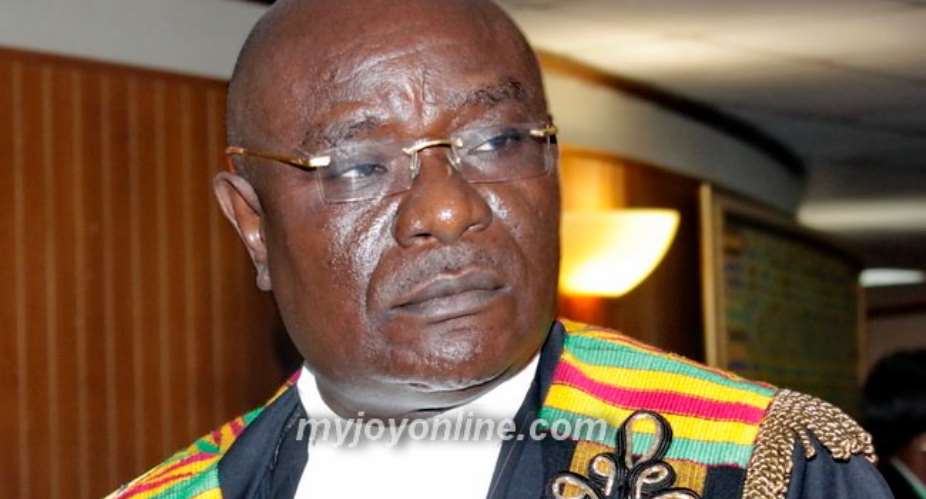The threats by parliament to punish some persons for contempt has been dismissed as having no basis in law or history.
In a joint assault launched by veteran journalist Malik Kweku Baako and lawyer Egbert Faibille Jnr, they explained that punishing for contempt rests with the courts and not Parliament.
House Speaker Edward Doe Adjaho on Wednesday, referred WHO scientist Professor Alex Dodoo to the Privileges Committee of Parliament where he is to explain comments he allegedly made calling MPs ignorant.
Prof. Alex Dodoo
His comments were allegedly made in reaction to Parliament's directive to the Health Ministry to suspend clinical trials of a vaccine against the deadly Ebola virus which accounted for the death of over 15,000 in West Africa.
Doe Adjaho ruled on Wednesday, “I have been very slow since I became a Speaker to refer matters to the Privileges committee. I will exercise my discretion in favour of the call to refer professor Dodoo to the [Privileges] committee”.
There has since been wild reaction on social media on the actions of Alex Dodoo and Parliament.
Commenting on the controversy on Multi TV and Joy FM's Newsfile, Egbert Fabaille chose the law as the basis of his position, leaving Kweku Baako to history of parliament in similar cases of alleged contempt.
Egbert referred to the 1965 Act of Parliament, Section 41 and 43 that provide for criminal prosecution for contempt of parliament.
Egbert Faibille Jnr
But he said, according to Article 88 of the 1992 constitution, power of prosecution lies with A-G.
If Parliament feels offended, it could only reprimand the contemnor, or refer the person to the Attorney-General for prosecution, he said, arguing that nothing more is afforded by law.
If found guilty of contempt, a person is liable to a fine not exceeding 200 penalty units or a prison sentence of not more than one year or both.
Although parliament has the powers of a High Court, “having the power of a High Court does not make you a High Court” Egbert Faibille stressed.
Abdul Malik Kweku Baako Jnr referred to an authority on parliament K.B Ayensu who co-authored ‘How Parliament Functions - an Introduction to the Law and Procedure’.
Abdul Malik Kweku Baako Jnr
He read portions of the book which conclude that parliament is not a court and cannot on its own impose a fine or a prison sentence on a person it deems as having acted in contempt of the legislative body.
The senior journalist read some of the views expressed by some MPs on the floor of the house in respect of the vaccine trial and said they were clearly ignorant.
He dismissed the parliament as being ‘overly sensitive’. “They are wasting everybody’s time”, Baako stated.
Story by Ghana|Myjoyonline|Edwin Appiah|[email protected]





 Whoever participated in the plunder of the state must be held accountable – Jane...
Whoever participated in the plunder of the state must be held accountable – Jane...
 A vote for John and Jane is a vote to pull Ghana from the precipice of destructi...
A vote for John and Jane is a vote to pull Ghana from the precipice of destructi...
 I’ll repay your abiding confidence with loyalty, understanding and a devotion to...
I’ll repay your abiding confidence with loyalty, understanding and a devotion to...
 ‘I’ve learnt deeply useful lessons for the future' — Serwaa Amihere breaks silen...
‘I’ve learnt deeply useful lessons for the future' — Serwaa Amihere breaks silen...
 I’m sorry for the embarrassment – Serwaa Amihere apologises for leaked sex video
I’m sorry for the embarrassment – Serwaa Amihere apologises for leaked sex video
 Dumsor: Matthew Opoku Prempeh not in charge of Energy sector – Minority
Dumsor: Matthew Opoku Prempeh not in charge of Energy sector – Minority
 Adu Boahen’s murder: Police arrest house help who was in possession of deceased’...
Adu Boahen’s murder: Police arrest house help who was in possession of deceased’...
 Akufo-Addo nominates Felicia Attipoe as Tema West MCE
Akufo-Addo nominates Felicia Attipoe as Tema West MCE
 Election 2024: I can't have someone I defeated twice as my successor – Akufo-Add...
Election 2024: I can't have someone I defeated twice as my successor – Akufo-Add...
